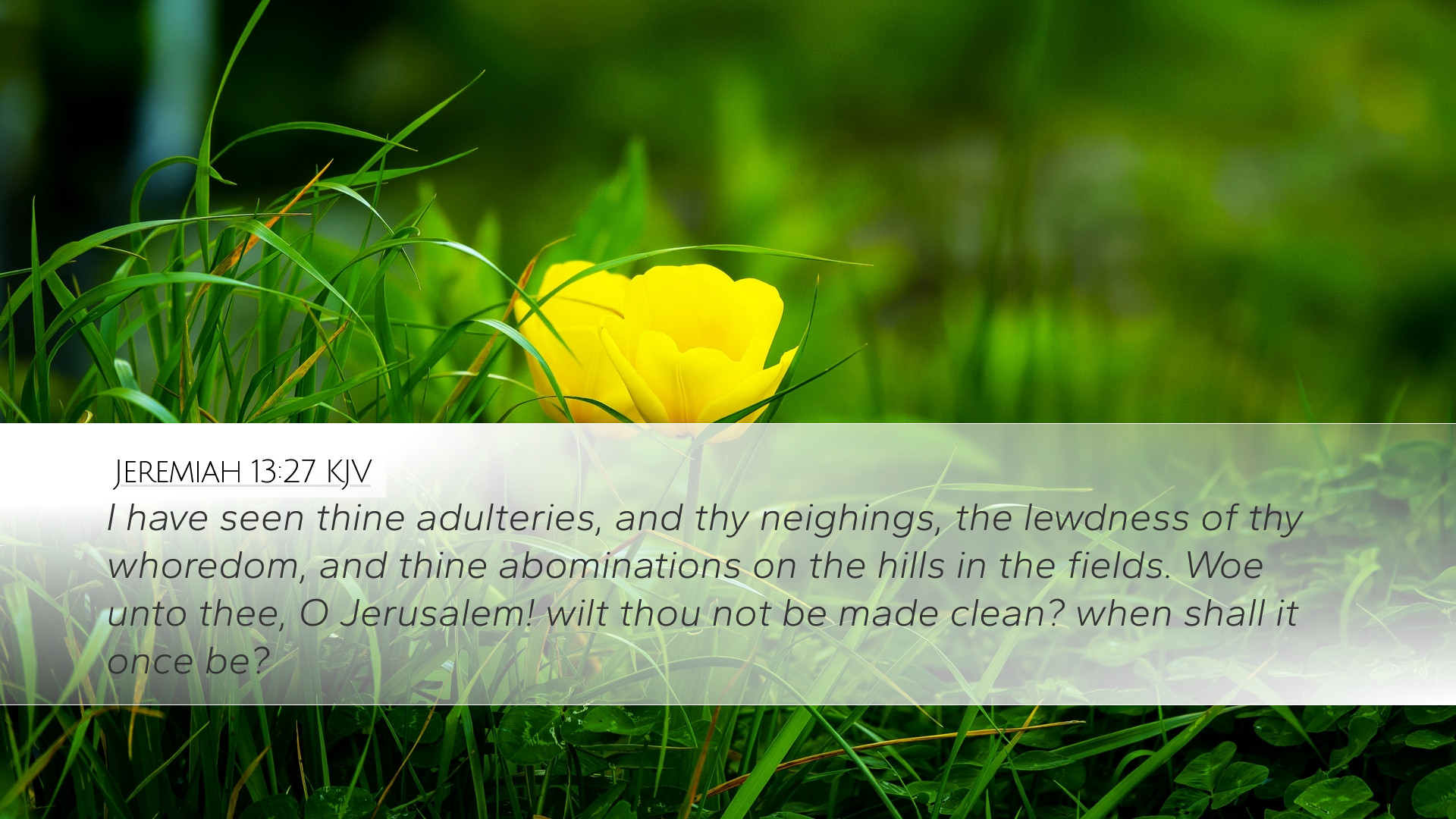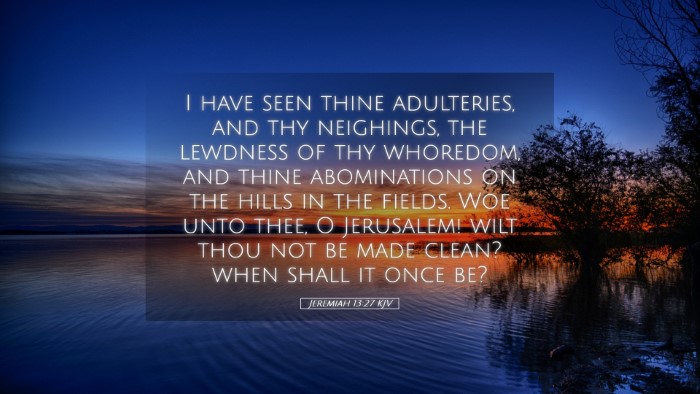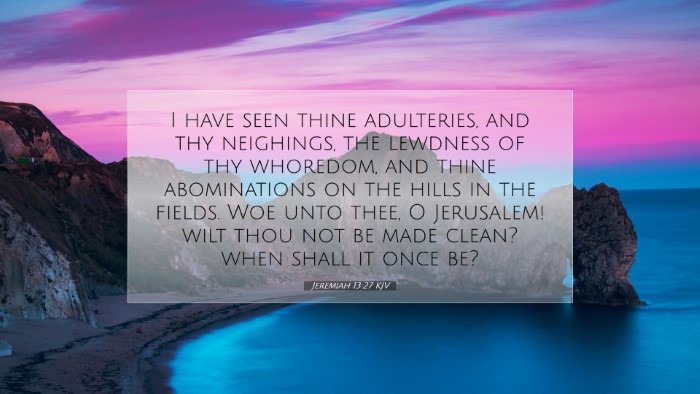Commentary on Jeremiah 13:27
Jeremiah 13:27 reads: "I have seen thy adulteries, and thy neighings, the lewdness of thy whoredom, and thine abominations on the hills in the fields. Woe unto thee, O Jerusalem! wilt thou not be made clean? When shall it once be?"
Introduction
The book of Jeremiah serves as a profound testament to God's covenant relationship with Israel, marked by fidelity and the call to repentance. Here, Jeremiah 13:27 encapsulates God's lament over Jerusalem's spiritual infidelity, depicted through vivid imagery. This passage presents the sobering message of judgment alongside a longing for purification and restoration.
Exegesis and Analysis
In assessing Jeremiah 13:27, we note several critical themes:
- God's Observance of Sin: The passage begins with God declaring His awareness of the people's "adulteries" and "whoredoms." This indicates not just physical immoralities but also the spiritual infidelity of turning away from God to pursue other 'gods.'
- Imagery of Degradation: The terms "neighings" and "lewdness" convey a powerful image of blatant promiscuity, suggesting both desire and corruption. The reference to "hills" indicates high places associated with idol worship, highlighting Israel's idolatrous practices.
- Call for Purification: The name “Jerusalem” highlights the people of God, indicating that the call for repentance is directed toward His chosen, emphasizing His desire for their cleansing and restoration.
Commentary Insights
Matthew Henry's Commentary
Matthew Henry emphasizes the gravity of the sins being addressed in this verse. He notes that the "adulteries" of Jerusalem represent a departure from God's ways. Henry elaborates that the imagery suggests deep-seated corruption, particularly as it relates to the worship of false idols. Jerusalem's spirit of rebellion and unfaithfulness is akin to a spouse's unfaithfulness in a covenant relationship, illustrating how grievous and painful such betrayal is to God. Henry concludes by pointing out that God's question about cleanness underscores a divine cry for repentance—an invitation to return and restore the broken relationship.
Albert Barnes' Notes
Albert Barnes provides a contextual background that enhances our understanding of this verse. He relates the warnings of judgment to the historical backdrop of Israel’s infidelity, reminding readers that throughout their history, the nation repeatedly turned away from Yahweh, engaging in flagrant idolatries. Barnes observes that this verse serves both as a warning and a lament, as God’s intention is not merely to condemn but to elicit recognition of sin and a genuine return to Him. The rhetorical question posed by God marvels at the obstinacy of the people—while they have known the right path, they persist in their filthiness and rebellion.
Adam Clarke's Commentary
Adam Clarke delves into the language and structure of the text, noting the appropriateness of the metaphors used. He mentions that "whoredom" here reflects not merely physical acts of unfaithfulness but symbolizes the broader spiritual transgressions that distance God's people from their Creator. Clarke assesses the phrase "Woe unto thee, O Jerusalem!" as an indication of impending judgment, yet he highlights the profound mercy behind the lament. God’s persistent desire for His people to be made clean is a testament to His loving nature, reminding scholars that even in judgment, there arises an invitation for renewal.
Theological Implications
This passage raises crucial theological questions regarding sin, judgment, mercy, and restoration. Scholars can explore:
- Understanding Sin: The description of sin as "adultery" highlights the relational aspect of sin against God, inviting deeper reflections on covenant theology and the implications of sin in breaking fellowship with God.
- The Nature of God’s Judgement: This verse illustrates God's justice intertwined with His desire for reconciliation. It serves as a primary teaching moment about divine holiness, calling believers to consider the enduring implications of unrepentant hearts.
- The Possibility of Purification: The rhetorical question posed at the end of the verse opens discussions on God's grace and the means by which restoration can be achieved—offering avenues for sanctification and renewal.
Practical Applications
For pastors and students of the Word, the themes of Jeremiah 13:27 can be translated into actionable teachings:
- Calls to Repentance: Church leaders can utilize this passage to invite congregants into deeper self-examination, emphasizing the need for personal and corporate repentance.
- Preaching God’s Holiness: The gravity of sin should compel preaching that articulates both God’s holiness and the desperate need for salvation through Christ, who cleanses from all unrighteousness.
- Emphasizing Restoration: Highlighting God's desire for restoration over mere punishment can bring hope to weary believers, affirming that no one is beyond the reach of God’s grace.
Conclusion
Jeremiah 13:27 serves as a potent reminder of the seriousness of spiritual unfaithfulness. The insights drawn from the commentaries of scholars such as Matthew Henry, Albert Barnes, and Adam Clarke deepen our understanding of God's heart towards His people—a heart that laments over sin while fervently calling for repentance and restoration. As we consider the implications of this verse, may we not only reflect on our own lives but also on the lives of our communities, urging each other to return to the purity and fidelity that God desires.


